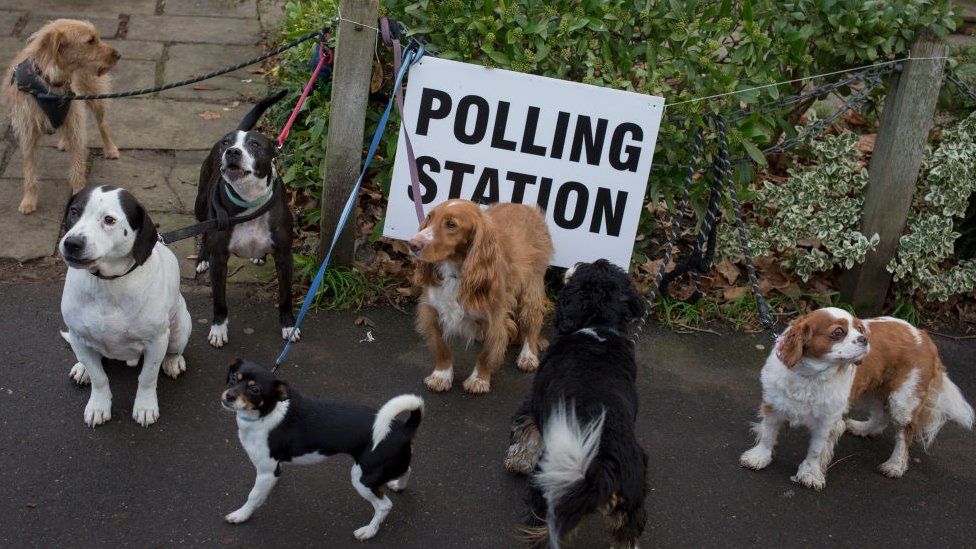ARTICLE AD BOX
 Image source, Getty Images
Image source, Getty Images
By Chris Mason
Political editor, BBC News
The senior political figure I'm having a coffee with leans over, clutching their phone, face animated.
Their finger is jabbing at an app. I am being given a glimpse of electioneering, 2023 style.
Up pops reams of data: street maps, doors knocked on, the political affiliations of those at number 37 or whatever going back years and years.
The currency of a campaign. Collated, crunched, shared and analysed.
Elections to politicians are what oxygen is to the rest of us - life is impossible without them, they are essential to survive.
So, little wonder there is a little breathlessness when an appointment with the people beckons.
Local elections are power-taking, mood-making moments - and this week's in England, and those in a couple of weeks in Northern Ireland, are no different.
There are elections in parts of every region across England, apart from London. Around 70% of England's electorate have the opportunity to vote.
First, then, it is worth spelling out the principal reason why these elections matter: they decide who governs closest to us, who will mould the places we live and work, who will run so many of the public services we rely on.
The councillors elected this week, alongside those already in place not fighting elections, will face almighty difficulties.
Recent research by the Local Government Information Unit suggests many local authorities have finances that are in a "critical state".
Plenty are cutting spending on services. Even more are putting up, or planning to put up, council tax.
Demands for adult social care, housing and children's services are spiralling for many councils, as more people turn for help with the cost of living squeeze.
Then there is collecting our rubbish and sorting planning applications among the things they do.
And all of this as councils, like the rest of us, deal with the consequences of inflation.
Image source, PA Media
Image caption,Rishi Sunak on the campaign trail in Cambridgeshire
There is also the political mood-making bit of these elections: they are a brutal gauge of popularity, or otherwise, for party leaderships.
An opinion poll here or there can be easily dismissed. Real elections cannot.
And so every party serves up a smorgasbord of expectation management in the weeks beforehand; talking down their prospects.
If you forecast oblivion, mere disaster can be spun as success.
The most important word in all of the noise of the next few days is this: Benchmark.
Not one to quicken the pulse, I grant you - but absolutely key to understanding what has happened.
The benchmark for the vast majority of the elections happening this week is 2019. That is when they were last fought - and so against which comparisons should be made.
We've had four prime ministers since then, a change of monarch and the UK has left the European Union.
Both the Conservatives and Labour did pretty badly in those local elections. The Liberal Democrats and the Green Party did pretty well.
Image source, PA Media
Image caption,Labour's Sir Keir Starmer meeting voters in Derbyshire
There is loads of stuff you can read here about these local elections, from how things are looking where you are to whether you can take a selfie in a polling station (no, you can't).
But, in big picture terms, here are the themes to look out for:
How badly do the Conservatives do? It is widely expected that the Tories are in for a rough time.
How well does Labour do? It is widely expected that they will do well.
But, the key thing on both these things will be extent: Just how bad do the Conservatives fare and just how well do Labour get on?
This matters massively in terms of who runs your local services in the coming years.
And it matters too in terms of what it says about the likelihood or otherwise of Keir Starmer becoming prime minister at the next general election.
Labour will argue any slump by the Conservatives is dire, given headlines like this one reporting more than 1,200 seats lost, in the Tory-leaning Daily Telegraph, after the results in 2019.
The Conservatives will point to any gap between Labour's current or recent national opinion poll lead and how Sir Keir's party does as evidence plenty are still unconvinced by Labour and there is all to play for at the general election.
Image source, PA Media
Image caption,Lib Dem leader Sir Ed Davey pulling pints in Hampshire
The Liberal Democrats are hoping to make gains in a semi circle of suburbia around London, among other places, where in almost every instance they are taking on the Conservatives.
Again, their success or otherwise will be a key indicator of the likelihood of breakthroughs at the general election, where the party is being much, much more geographically focused on where they put their campaigning effort than they did at the last general election.
Keep an eye on the Green Party too, which has fared well, albeit from a low base, in recent local elections and has a particular eye on Mid Suffolk among other places.
And then, also into the mix, a plethora of candidates, residents groups and local parties that aren't Conservative, Labour, Lib Dem or Green - but surprise us as the results become clear on Friday.
Do join us for all the results, across TV, radio and online, from late on Thursday evening and throughout the day on Friday.

 1 year ago
119
1 year ago
119








 English (US) ·
English (US) ·